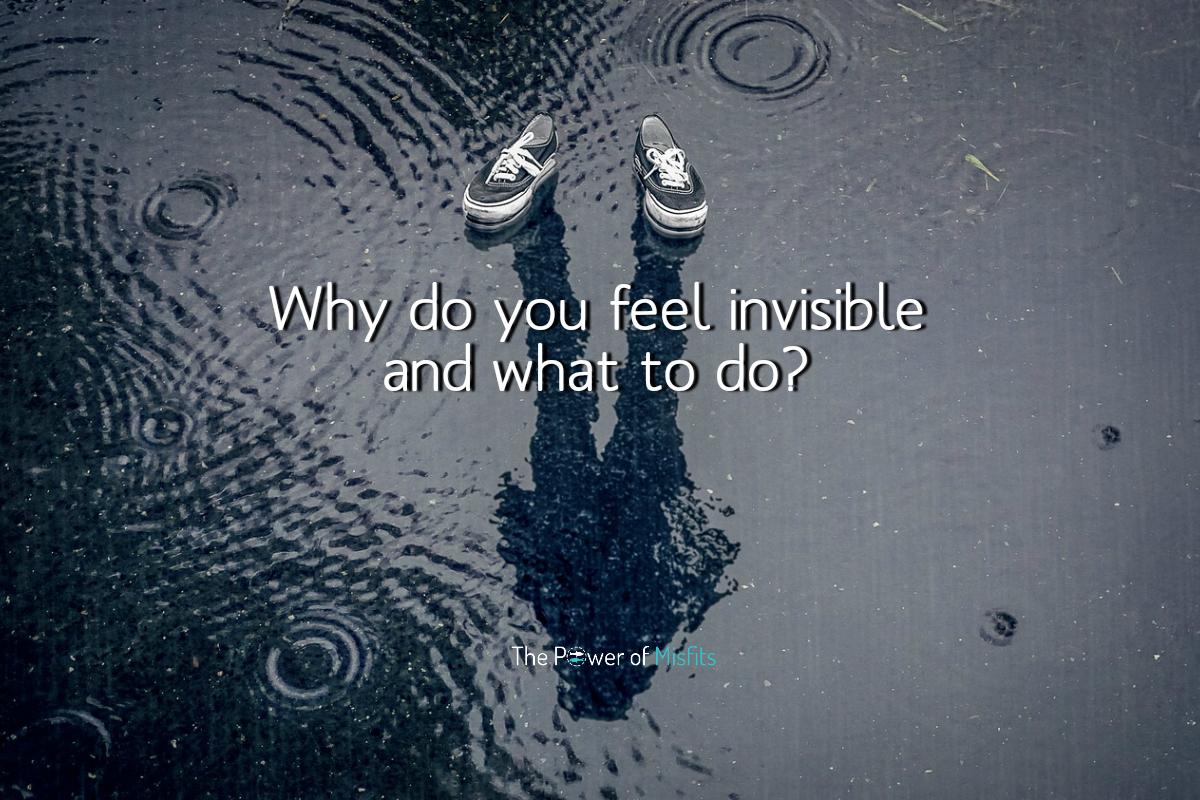If you are feeling invisible right now, you are not alone. Many people experience this emotional state from time to time. But if you often feel this way, it’s important to figure out the reason why.
Sometimes I feel invisible in big groups and I know it happens because I’m a loner and struggle to relate to others.
What about you? Read through the list below to find out the reasons why you feel invisible to others.
Why do I feel invisible? 6 possible causes
1. You are too concerned with pleasing others
Being a people pleaser is a sure road to feeling insignificant and invisible. Someone who cares more about pleasing others than being true to themselves creates ground for being used and unappreciated.
When you don’t know how to say no, people find it easier to take advantage of you. But the worst part is that at some point, they take your help for granted and no longer appreciate your effort.
Helping others is beautiful. But it ceases to be so when those around you begin to exploit you. When you always put others first and neglect your own needs, don’t be surprised if you end up feeling unappreciated and invisible to those around you.
2. You are too afraid to disagree with others
The same happens when you always agree with others. You may do it because you are trying to make those around you like you. Or you may just be afraid to stand out and confront other people.
But if your position never differs from that of others, you turn into a person who doesn’t have an opinion of their own.
This is when those around you don’t even bother to ask for your opinion and don’t hesitate to make decisions for you. They assume that you will agree with them because you always do.
This is a particularly common cause of feeling invisible at work. If your co-workers tend to brush off your opinions and suggestions, ask yourself whether you conform to others too often.
3. You never voice your opinion or speak up for yourself
If you feel ignored and unappreciated at work, let me ask you something.
Do you ever voice your opinion or do you just prefer to keep quiet and follow others’ suggestions? If you have a disagreement with a co-worker, do you stand your ground or just give up without even trying?
When you don’t speak up for yourself and don’t express your opinion, it’s a one-way road to feeling invisible at work and in social settings. You may be afraid that your opinion is unpopular and other people will reject or laugh at you. But by behaving this way, you make yourself seem insignificant.
Many introverts struggle with this. They are more efficient in solitary work and one-to-one communication. That’s why they prefer to keep quiet during office meetings and group discussions.
I know I feel invisible at large social gatherings mainly because I don’t enjoy them. If you are an introvert just like I am, it could explain the cause of your emotional state.
4. You have unhealthy thought patterns that stem from mental illness or low self-esteem
Mental health issues like depression and social anxiety fool us into believing that we are less capable and worthy than we are. The same is true if you have low self-esteem. These issues plant unhealthy thought patterns in your mind, leaving you feeling inadequate and worthless.
This is why you don’t even try to share your opinion with others or stand your ground when you are right. You assume that people won’t take your side anyway. You believe that they will prefer to follow someone more assertive and capable.
These negative thought patterns ignite your inner critic and plant limiting beliefs in your subconscious mind. You may not even be aware that they exist, but they greatly affect the way you perceive yourself and those around you.
5. You are surrounded by people who don’t appreciate you
Sometimes you ask yourself, “Am I invisible?” when you should be asking, “Do those around me make me feel invisible?”
Sadly, many of us have overly critical and toxic personalities in our circle. Sometimes it may take years until you realize the power of their toxic influence on your self-worth.
It might be a friend who makes nasty remarks every time you talk about your dreams and goals. Or a passive-aggressive colleague who deprecates your work efforts.
You may also have friends who take advantage of you. In reality, they are not your friends at all. They just find you convenient because you say yes every time they ask you for a favor. And even worse is that they are not even grateful for your help.
All these people make you feel invisible and worthless, whether you realize it or not.
6. You were neglected as a child
Neglecting a child’s needs is a sure way to program them for feeling invisible later in life. In early childhood, we take things at face value. If our parents ignore us, we form a belief that it’s our fault and we deserve to be ignored.
Therefore, if you were raised by an uncaring mother or father, it could explain why you feel invisible as an adult.
Uninvolved parenting leaves a person wondering whether they deserve to be loved and appreciated. And this question usually haunts them for a lifetime, paving the road to self-doubt and self-deprecation.
Yes, sometimes feeling invisible doesn’t have a real basis and is just a product of your impaired self-perception.
How to stop feeling invisible?

1. Pay attention to your emotions
When do you usually feel invisible? In the workplace, your family circle, or even your marriage? In what situations and with what kind of people around you do you experience this emotion? It’s the first question you need to ask yourself.
For example, feeling insignificant at work and feeling ignored at a party is not the same. You may also be particularly prone to this emotional state when you spend time with a specific person.
In all these cases, the culprit of feeling invisible will be different. So the first step is to pay attention to your emotional responses to different situations and people.
2. Learn to say no
If you’ve learned to play the role of a people pleaser over years, it’s not going to be easy to drop this habit. But at the same time, it’s a crucial thing to do for your mental wellbeing.
If you don’t want others to underestimate your efforts and take advantage of you, you need to learn to say no.
How? In small steps. If you are used to agreeing with everyone, it will be difficult to say a clear no the next time your co-worker asks for a favor. But you can at least try to not say yes.
For example, if your friend in the office is asking you to check his report as he always does, tell him you have too much work today. This kind of answer doesn’t sound like a clear rejection but also lets him know that you are not available for help.
The same would work with calls after working hours and all kinds of favors your colleagues or friends might be asking for. You can always say that you are too busy or have family issues.
The point is to make others realize that you have needs and responsibilities of your own. You have to convey the message that you know how to set boundaries and put yourself first.
3. Evaluate your social circle
Do you tend to feel invisible in the company of a specific friend or relative? In this case, it’s important to understand why.
Are they talking about themselves all the time? Do they get critical and mean when you speak your mind? Do they only remember about you when they need something?
There can be many instances of toxic social connections, but they all have the same core: your friend doesn’t care about you.
If they are too negative and critical, it means that they are inconsiderate of your feelings. If they use you as a crying shoulder or person who solves their problems, then this friendship is based on convenience, not genuine interest. Therefore, it’s important to spot such people in your social circle.
4. Combat your self-deprecating thoughts
The feeling that you are invisible and insignificant to others often stems from self-deprecating thoughts. In this case, this emotion is just an illusion that arises from your unhealthy self-perception.
When you feel invisible, practice self-awareness. Watch out when the following thoughts pop up in your mind:
- No one appreciates me
- No one cares about me
- I’m nothing to them
- If I disappeared, they wouldn’t even notice
- I’m nobody
- I’m insignificant
- Who would respect/love/like someone like me?
As soon as you catch yourself making these kinds of thoughts, combat your inner critic. Confront what it says and replace it with a positive statement about yourself. To learn more, check this article about the ways to stop feeling not good enough.
5. Put an end to one-sided friendships
If you have friends or colleagues who are exploiting your kindness, it’s time to put an end to these one-sided relationships. It can be a co-worker who talks to you only when they want to ask you for help or a former classmate who pops up in your life just because they need something.
It’s time you realize that people who take advantage of you are not your true friends, even if they do their best to seem so.
Believe me, you are better off without them. These people just waste your time and drain your energy without giving anything in return.
If you struggle with setting firm boundaries, begin with not saying yes to their requests, as we discussed above. With time, they will find another friend of convenience and will no longer turn to you for help.
Strong self-esteem is the key to stop feeling insignificant
To sum up, if you want to stop feeling invisible and unappreciated, the most important step is to work on your self-esteem.
As soon as you feel more confident and powerful, you will find it much easier to say no, voice your opinion, and stand your ground.
This is when you will no longer be invisible to others. They will value your opinion, appreciate your presence, and take your suggestions into consideration.
And the greatest part is that with sound self-esteem, you will no longer worry about what others think and feel about you.


